Themes > Features
13.11.2001
What is at Stake in Doha ?
The ongoing WTO Ministerial Meeting at Doha in Qatar was the focus of
controversy well before it started. The WTO has been subject to growing
criticism not only from governments of developing countries but also from
civil society in developed and developing countries. It has been found
that the way in which the Uruguay Round Agreement has worked in practice
has contributed not to the promised increases in trade and economic
prosperity, but greater income disparities, livelihood insecurity and
reduced access to essentials like life-saving drugs for people across the
world.
Protests against these outcomes, both on the streets and within the
meeting rooms, led to the failure of the Seattle talks. For a while it
even seemed as if the Doha meeting would not go through, because of
security fears of the US and other developed country delegations after
September 11. In fact, this has reflected itself in reduced participation
at the senior level : for example, the number of people in the official US
delegation has shrunk from about 300 to 40, and neither the US Secretary
of Commerce nor the Secretary of Agriculture is present, nor is there a
representative of the US Congress.
That the Doha meeting is still being held reflects several forces : the
sheer embarrassment at the multilateral level, at having to postpone such
a meeting which is formally mandated by the GATT accord and which has been
planned for two years; the need to make up for the failure of the Seattle
meet; the desire of some developed countries to initiate a new Round of
trade negotiations which would include non-trade issues such as investment
and competition policy and reductions in industrial tariffs
Simultaneously there have also been other, more insidious, attempts to
treat the September 11 attacks as a means of pushing even more external
liberalisation down the throats of developing countries. The pretext is
that such terrorism is an attack on free trade which will supposedly
deliver prosperity for all. And the US Trade Representative made it very
clear that he saw the need for even greater and more comprehensive trade
talks because of, not despite, the terrorist attacks and the
subsequent war.
However, most developing
countries, and certainly most ordinary citizens in all countries who have
some knowledge of the actual experience with trade patterns and the
effects of external liberalisation on domestic output, employment and
livelihood security, are understandably sceptical about such an argument.
In fact, as shown below, the experience since 1995 has been very
disappointing.
Projected gains from the Uruguay Round Agreement
At the time of
signing the GATT agreement in Marrakesh in 1994, there were widely
publicised reports of the supposed gains to all countries from the various
measures covered in the Agreement. These gains were supposed to come from
tariff reductions, opening of agricultural trade and reduction of
subsidies by developed countries, liberalisation of trade in textiles and
clothing and better market access for all exports. In economic terms,
these were then supposed to involve the following kinds of gains
1) "Static gains" due to a reallocation of resources to areas of comparative advantage (that is, those that are relatively better at producing particular goods).
2) "Efficiency gains" that would result from reduced slack in economies that have been highly protected.
3) "Dynamic gains" due to improved technical efficiency or lower input use per unit of output and technological change.
While the first was supposed
to result from a shift international production patterns, the second and
third were supposed to emerge from stronger competition within and between
national economies. The projections of such gains in terms of increased
value of world trade ranged from $180 billion to $ 230 billion over ten
years, around two-thirds of which was supposed to accrue to developed
countries and one-third to developing countries.
It was largely the promise of such gains that lured most developing
countries into signing the entire Final Act, even though many specific
agreements such as those relating to intellectual property and investment
measures were seen as detrimental to their interests, and aspects of the
other agreements were also problematic for them. Even the Indian
government presented the case in favour of signing the Marrakesh Agreement
in terms of the benefits that would come from increased exports of
agricultural and textile products as well as more inflows of investment
because of greater international trade in general.
Actual trade patterns over the 1990s
In what follows, we consider
the broad patterns of world merchandise trade over the 1990s. As will
become evident, most of the expectations have not been realised, and the
projections of increased trade flows were far too optimistic. In fact
world trade growth has been slower in the second half of the 1990s, after
the signing of the Uruguay Round agreement, than in the first half of the
1990s. And many developing countries feel that they have even greater
problems of market access and protectionist barriers to their exports than
they had before. This is why implementation issues have become so
important among developing countries in the WTO.
There is no doubt that international trade has become far more significant
in the world economy, and over the past two decades world trade has grown
faster than world output growth, as Chart 1 shows. However, as evident
from Chart 2, over the 1990s the value of world trade has fluctuated
substantially over the major product groups, and only in mineral products
(which include petroleum) has it gone up rapidly, mainly because of rising
oil prices in world markets over the second half of this period. In fact,
in agriculture, the value of world trade has stagnated and then fallen
over the 1990s, while manufacturing exports grew more slowly in the second
half of the decade.


This becomes even more clear from Chart 3, which shows annual compound rates of growth of exports in dollar values for the major product groups, over the two halves of the decade. Note that this division also marks the period before and after the formation of the World Trade Organisation, which was supposed to lead to a rapid and exponential expansion in world trade. In all the major commodity groups except mining (for which the increase in export value growth is almost entirely the result of rising oil prices) rates of growth of exports in world markets have fallen, and for agricultural exports they have turned negative.
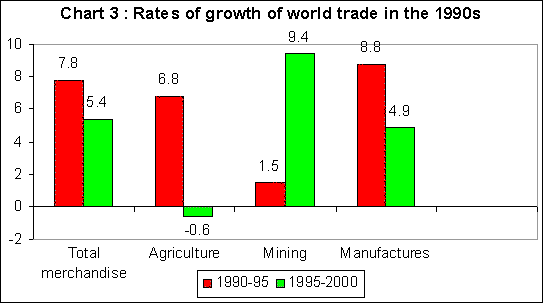
Obviously, the promise of rapid trade expansion consequent upon the
signing of the Uruguay Round GATT agreement has thus far turned out to be
a false one. A basic reason for this has indeed been because the
expectations of increased market access for developing countries have not
been met. In the areas where developing countries expected the most gains
– tropical agricultural products and textiles and ready made garments,
market access conditions for developing countries have worsened.
And this has happened completely within the legal provisions of the GATT
Agreement. This tends to confirm the point made by critics at the time,
that these agreements themselves were flawed and unequal, drawn up in
forms which were inimical to the interests of developing countries as well
as workers and consumers in developed countries.
The combination of stagnant or reduced market access and increased export
dependence of many developing countries has meant that many developing
countries have had to respond to this by trying even harder to push out
exports, at lower prices if necessary. In fact this downward pressure on
many export prices has been evident even in developed countries, and in
both primary and manufactured goods.
Chart 4 describes the movement of unit values of exports over the 1990s.
It shows how, other than for oil, unit export values have declined
continuously from the rather low peak of 1995. For agricultural exports,
which have been the hardest hit, unit values of exports have fallen by
nearly 20 per cent just in the five year period between 1995 and 2000.
Even for manufactured goods, unit values have fallen by 17 per cent over
the same five year period. These translate into very sharp annual average
declines of nearly 5 per cent and 4 per cent respectively, as Chart 5
indicates.
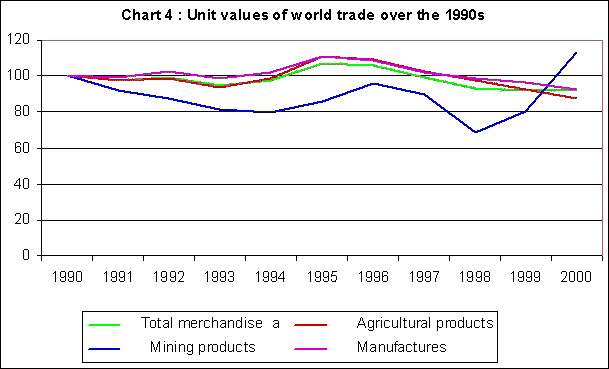
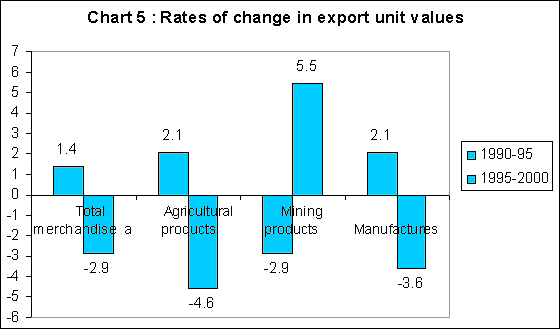
These world trade price declines are especially evident in the case of primary commodities other than oil. Chart 6 shows how prices of raw and processed food have fallen over the 1990s, and Chart 7 makes it clear that minerals and metals other than petroleum have also faced stagnant or falling prices. Incidentally, as can be seen from Chart 8, even crude petroleum prices have only risen significantly in the last two years of the decade, and that has created the impression of buoyant prices in this category.
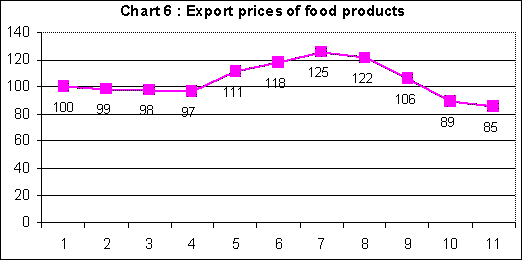
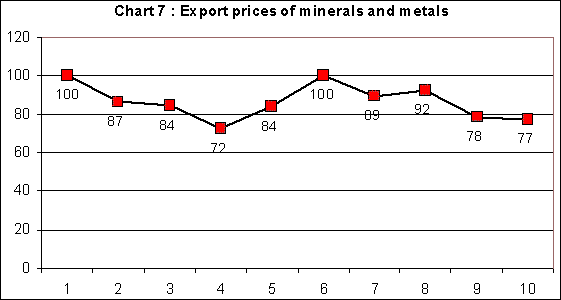
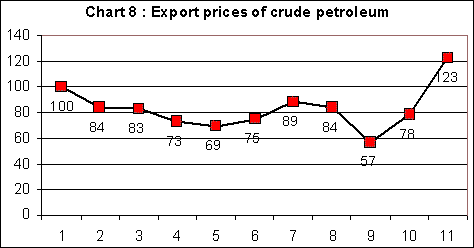
The interesting point that emerges from the Charts 9 a, b, and c is that in the two decades since 1980, the share of developing countries in world trade has not increased, which is quite contrary to general position. Even in the decade 1980-1990, which was the period of rapid expansion of manufacturing exports from the East Asian economies and other newly industrialising nations, the overall share of developing countries in total world exports fell quite sharply, largely because of the decline in primary exports in value terms. The subsequent recovery in share over the 1990s in turn can be traced once again to primary exports – essentially the rise in oil prices – rather than manufactured goods exports as such.
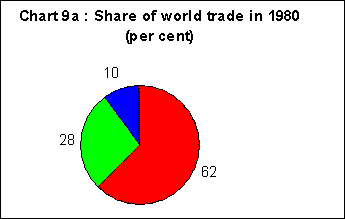
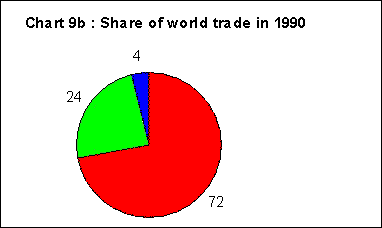
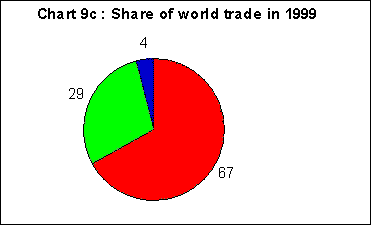
The point in all this is of course that that the expectations about
greater access to developed country markets, or about trade deregulation
leading to much expanded volumes of trading activity and greater
prosperity for developing country exporters as well, have proved to be
false thus far. It is misleading to argue that all these benefits would
become evident only by 2005 : the point is that the GATT Agreement was
supposed to have unleashed dynamic processes which would already have made
themselves felt through more buoyant trade, but in fact the opposite has
occurred.
It is in this context that developing countries’ demands
for review and implementation of the existing treaties must be seen. The
point is that developing countries have not received trade benefits which
would have made it worth their while to give up so much in terms of the
adverse consequences of the TRIPS agreement, their own import
liberalisation which has affected domestic output and employment, and loss
of sovereignty in other decision making. And therefore the calls for
review of the agreements, their implications and implementation, followed
by possible renegotiation of these agreements, are perfectly legitimate
demands.
The
pre-Doha negotiation process and the Draft Ministerial Declaration
What has made the Doha meeting even more controversial has
been the practice adopted by the current WTO Secretary General, Mike
Moore, and the Chairman of the General Council, Stuart Harbinson of Hong
Kong. The pre-Doha negotiations were intense and many developing countries
put in tremendous energy and effort using scarce resources to put in their
arguments and present papers which outline their positions in some detail.
However, the first version of the Draft Ministerial Declaration paid only
the slightest attention to these papers and demands.
The second draft, which is
being presented at Doha, is even worse because
It is being presented
as a “clean” text, without brackets and indications of areas of
disagreement, supposedly to simplify matters and make the draft easier to
discuss. In reality, of course, it has become a statement of the position
of a few powerful Northern WTO members, especially the US and the EU.
This has
been a source of extreme disaffection for more than 30 developing country
negotiating teams, including those of India, Indonesia, Malaysia, Egypt,
the least developed countries group and other Sub-Saharan countries. One
umbrella grouping of civil society organisations which have been closely
monitoring the negotiations found it necessary to issue a statement which
condemned the process by which the draft Ministerial Declaration has been
transmitted to the Doha Ministerial Conference. The statement makes the
following points :
“The draft has not been given the consensus agreement of WTO Members, and
there are serious differences between countries in many of its sections
and paragraphs. In particular, many developing countries have repeatedly
disagreed that negotiations should be launched on "new issues"
(investment, competition, government procurement transparency and trade
facilitation).
Yet the
draft specifically commits Ministers to agree to such negotiations, and
does not provide for options. This totally ignores the views of the
people and governments of a majority of developing countries.
Many developing countries also proposed to have a study process on the
effects of past industrial tariff reductions on closure of local
industries and job losses instead of negotiations. Yet paragraph 16
commits the Ministers to launch negotiations, which can damage developing
countries' local industries and cause serious job losses.
By not
reflecting the differences in view (either through square brackets or
showing the various options), the draft gives a very deceptive impression
that there is already agreement, or that the views given command unanimous
or overwhelming support. The deception in such a "clean text" has the
serious effect of favouring the developed countries that have campaigned
for the new issues, whilst placing the developing countries opposing these
issues at a great disadvantage.
This incident
is another outstanding example of the untransparent, discriminatory,
biased and manipulative process of decision-making at the WTO, that
favours a few major developed countries at the expense of the many
developing countries.
It is ironic
and hypocritical that such untransparent and discriminatory practices are
so prevalent in an organization that claims transparency and
non-discrimination as its core principles.
We consider the draft Declaration as illegitimate and a threat to the
development and economic and social viability of developing countries.
It has also failed to address the grave concerns of civil society on the
effects of the WTO agreements (and future proposed rules) on food
security, human rights, access of consumers to essential goods and
services, and the right of local communities and workers to secure
livelihoods.
In particular the TRIPS agreement has been debated and condemned by the
public worldwide for its role in depriving consumers of access to
essentials. An organ of the UN Human Rights Commission has noted that
implementation of TRIPS conflicts with the realisation of economic, social
and cultural rights. Yet the draft Ministerial Declaration does not deal
with the wide range of issues brought up by citizen groups (including
biopiracy) whilst the attempts by developing countries to clarify that
nothing in TRIPS should prevent public health measures is being undermined
by a few developed countries.” (quoted from the Joint NGO Statement on
the Draft Doha Ministerial Declaration)
The Government of India’s position
For once, the Indian
government stand thus far at the WTO and at the Doha meeting in the first
few days has been a correct one, that all further trade negotiations must
be postponed until a proper and democratic review of the past agreement
and its implementation has taken place. Such a review would immediately
expose that most developing countries have gained little or nothing,
especially in the areas of agriculture and textiles, while they have
opened up their own markets and adversely affected their own incomes and
employment.
However, while this position is most certainly to be welcomed and
supported, it is also true that the same Government of India has itself
engaged in the most sweeping and unjustified external liberalisation in
the past few years, even well beyond any requirements and commitments made
to the WTO. Therefore it is not clear whether this is a case of public
posturing at an international forum in order to gain some domestic
credibility, even while giving up on the important issues in terms of
actual economic policies.
It is also not clear the extent to which the Indian
government is prepared to stand up to pressure from the powerful Northern
countries. A number of other developing countries have already succumbed
to pressure, or gone in for bilateral deals which have muted their
opposition to a new Round which would incorporate issues such as
investment and competition policy. The outcome of the Doha Ministerial
Meeting is still not clear; but what is definitely true is that strong
domestic public opinion and the pressure of social movements may
contribute to a more democratic outcome even in the closed door
negotiations at Doha.
© MACROSCAN 2001